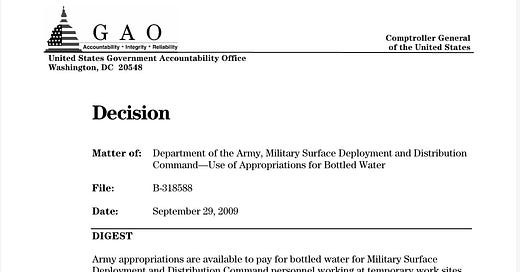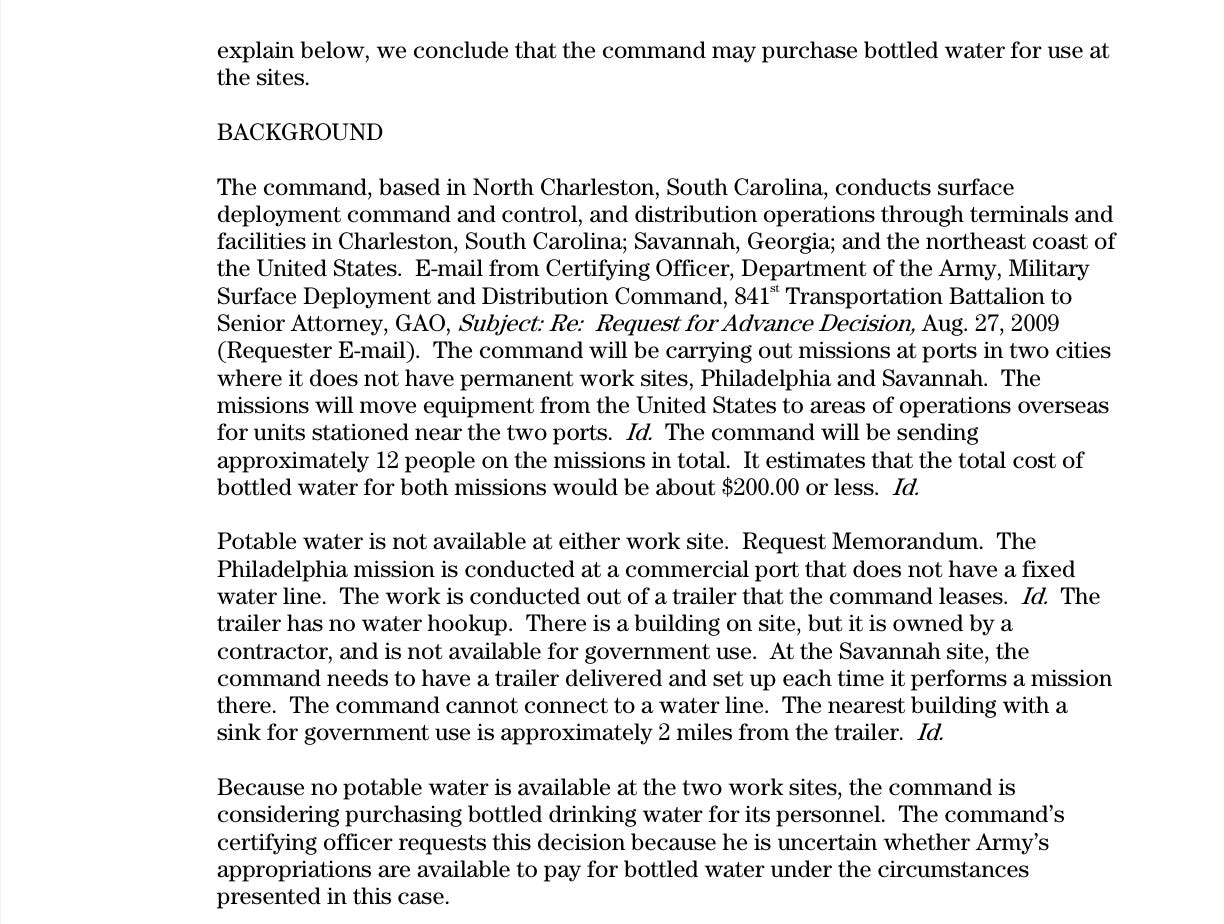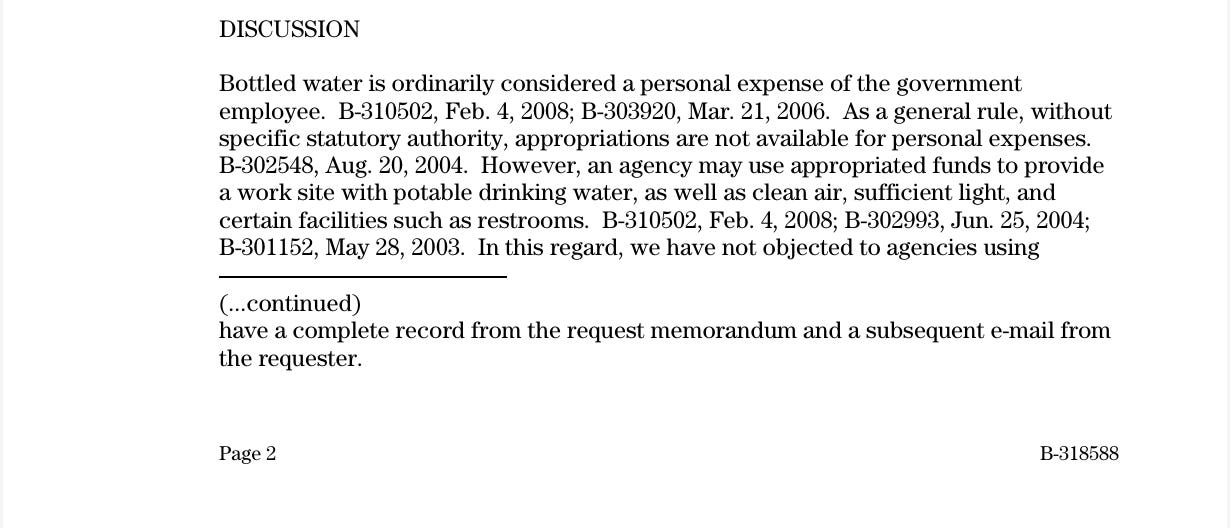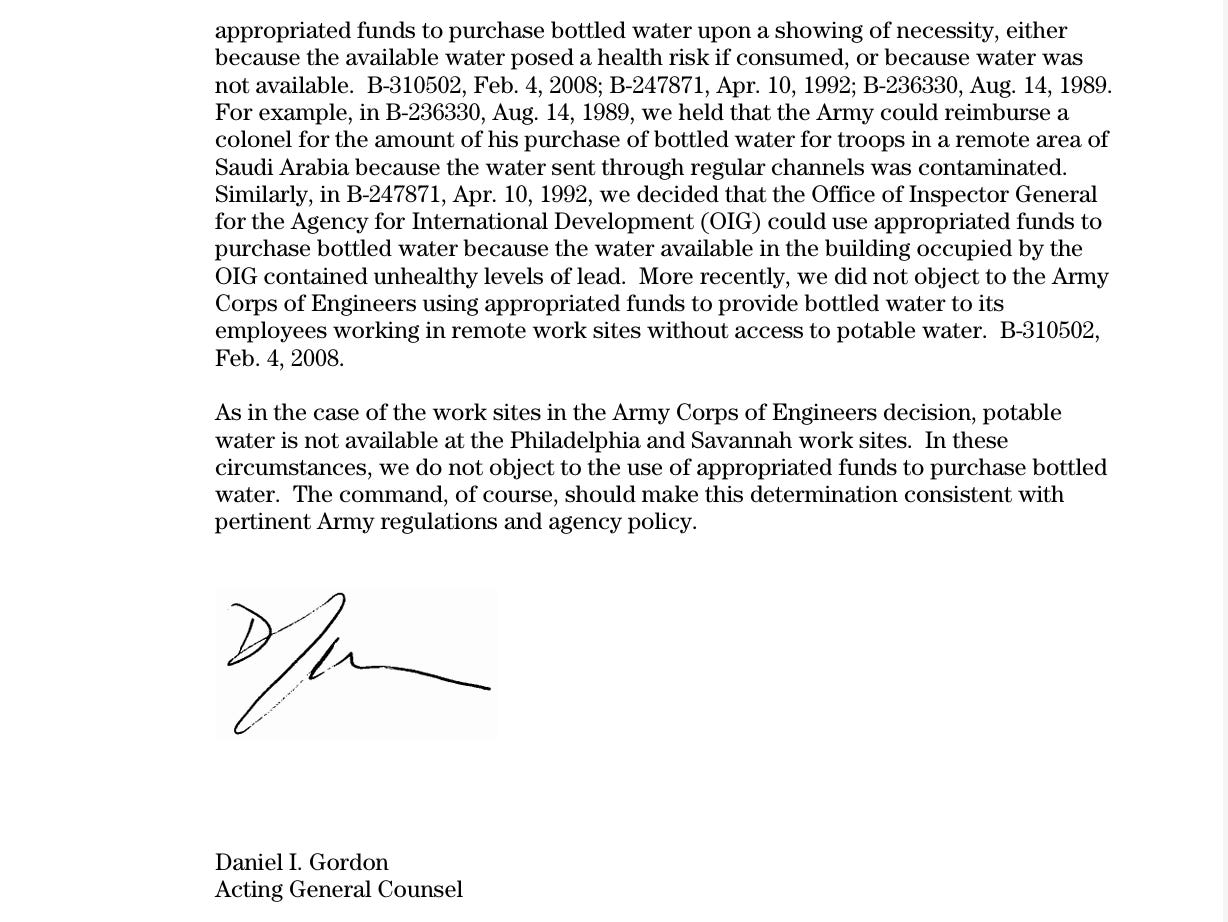Indulge me, dear reader, and study the following decision from the Government Accountability Office responding to a memo from a Certifying Officer of the Military Surface Deployment and Distribution Command of the Army entitled Request for Advance Decision-Use of Appropriations for Bottled Water, Aug. 7, 2009. 12 soldiers would be carrying out missions at ports in two cities where the command did not have permanent work sites. Since there was no water access, could the command pay for bottled water for these servicemembers?
Why, Pahlka? you are now asking. That’s 5 minutes of my life I’ll never get back. But I have a point. Today, we’re like George Saunders’ Story Club, except instead of dissecting short fiction, we’ll lightly deconstruct this obscure GAO decision memo. (Note to self: start new blog that does this weekly.)
Let’s start at the end. This memo is signed by Daniel I. Gordon, who was at the time Acting General Counsel of the GAO. I bet this guy went to Harvard Law, my instincts tell me. Yep. He also graduated summa cum laude from Brandeis University and got a masters at Oxford. He was later appointed to the head of the Office of Federal Procurement Policy under President Obama. (Remember Kevin telling us that OFPP was one of the most underrated jobs in federal government?) So it’s a reasonable guess that some subordinate probably wrote this memo, and Gordon just signed off on it. But still, while he pored over texts at Oxford and Harvard, what are the chances Gordon dreamed of weighing in on whether an army commander could expense $200 worth of plastic bottles of water from Costco? Not high. He was the executive editor of the Harvard Civil Rights-Civil Liberties Law Review. He thought loftier thoughts, I guarantee you. (And no, I’m not mocking him.)
Whoever wrote the decision took their job very seriously. The author cites 11 precedents, three establishing that bottled water is ordinarily considered a personal expense of the government employee, and eight establishing the exception for when “the available water posed a health risk if consumed, or because water was not available.” Each is referred to by the file number and date. How long do we think it took the author to research and write this? Did our author have the case law, so to speak, all in his/her head? How good is the GAO’s search functionality for this kind of research, or at least how good was it in 2009, when the memo was written?
The email requesting the decision came in on August 7, and the memo is dated September 29. Seven weeks is actually pretty fast turnaround, in my view, but it does beg the question of what the soldiers drank in the meantime. Did they delay the deployment pending clarification of the policy? Did the soldiers pass the hat for a flat a day in the meantime? But more to my point, which I’m getting to, seven weeks speaks to a process. How many people had to review this memo before it was published? How much did taxpayers spend on this decision? In 2024, lawyers at GAO made between $99,913 and $191,900. Not counting the GC, who presumably makes more than this but probably spent little time on this personally, we spent up to about $100 an hour every time a staff lawyer touched it through what are presumably several layers of review beyond the research, writing, and publishing online. Then there’s the time spent on the Army side discussing this and requesting the guidance. I’m not going to do wildly speculative math here, but let’s just say it's fair to assume that this decision cost quite a bit more than the $200 in question. And with the eight prior precedents cited (were there more, and have there been more since then?) it’s not the only time we’ve clarified this particular policy.
My point is definitely not that lawyers at GAO make too much. They should probably make more. But we should focus them on high value work. And I certainly don’t mean to gloss over the need for rules. We need rules. But we also need reasonable judgement in the application of those rules closer to the ground. Lacking it, we feed a narrative about waste in government. There is less support for the public servants whose jobs have been eliminated because of it.
There is waste, fraud, and abuse in government, to be sure. Medicare and Medicaid fraud is real, and we should make it easier to prosecute these cases. (Elon thinks you just catch the fraudsters and lock them up — in fact, you spend years building a case and refer it to the Department of Justice, and let the wheels turn at the speed they may. There should be a middle ground.) But a lot of what people perceive as government waste is stuff like this — just unwise use of resources directed by very smart, dedicated people. Why would smart, dedicated people do this? Because in American culture, the people don’t trust their government.
My point is actually this: an enormous amount of the waste in government (and what some might call abuse) comes from people trying very hard to avoid the perception of waste and abuse. We’ve made it a first order thing. Most people who work in government (and make less money than they could) do so because it means something to them to serve the public. But serving the public turns out to involve catering to a deeply ingrained mistrust, which distorts the work, leaves soldiers thirsty, and drives further mistrust. Looking for someone to blame?
My point, dear reader, is that this starts with us.
***
PS: For those of you in need of practical clarity on topics like these, aka current feds, here’s a decision tree covering whether you can purchase meals or snacks. More of these here in the GAO Red Book.









So, I like this piece a lot and the general point I think is correct. This one however reads to me more like either an overly paranoid certifying officer, or an internal conflict within the agency about the appropriateness of a purchase and someone going outside to get support. I do wonder about the effect of removing some authority/protection/responsibility from contracting/certifying officers and dumping it back on leadership (you can order them to buy the water, but if you're wrong, you're in trouble, not them).
More broadly, in my experience the stuff that 'feels like' waste comes in five flavors.
1) Straight up fraud. Heard about it, but never been involved in anything that actually proved to be fraud or theft (closest I came turned out to be the reverse, guy was accused of stealing molding from a job site, turned out he'd donated molding left over from a home renovation for trim work and had the receipts to prove it--not clear that was appropriate either, but that wasn't what we were investigating and investigating for being overly generous to the agency was not high on our list of priorities--details changed to preserve anonymity).
2) Over-centralization. 'Everything needs to go up the chain, so I'm never surprised.'==long delays and absurd overmanning on most things.
3) Mistakes in discretion. 'This seemed like a good idea at the time, but didn't work out, for reasons which may or may not have been clear at the time.'
4) We have to follow policy, which arguably applies here and says do something silly. No, we have to follow policy...or seek an exception. The authority which issued the policy (or some other delegated/designated entity) can issue them and in my experience is pretty open to doing so if you give a reasonable justification.
5) Congress told us to do it. This one legally isn't even waste, so long as it's true. If congress tells us to take over road maintenance in the richest town in the state, because the local representative got that in a bill to reduce his property taxes (example altered to preserve anonymity and motives perhaps unfairly ascribed, not stated) then doing so isn't 'waste' but it sure as fuck feels like it!
You may note that 2 and 3 are in conflict...yep. Gotta find a balance.
ETA: The GAO website isn't too bad, though it's no WestLaw--not sure how it was in 2009, but the Red Book has been around for a while and is a great resource!
I remember being fresh out of college in my new government role and my supervisor gathered up all of us to talk about TDYs and travel. He said "remember, our responsibility is *not* to do this in the most efficient way, it is to do it in the most *accountable* way." He repeated that no fewer than three times, necessary because all of us new employees constantly make the mistake of trying to do the government (and taxpayers) a favor by rationally spending less. He quite literally had to beat it into us to take the money and stop thinking about how weird and wasteful it was.